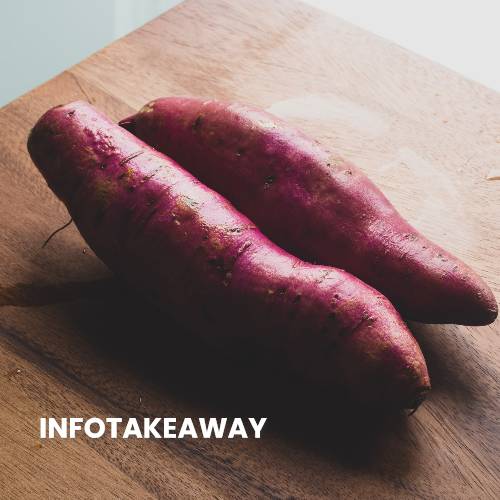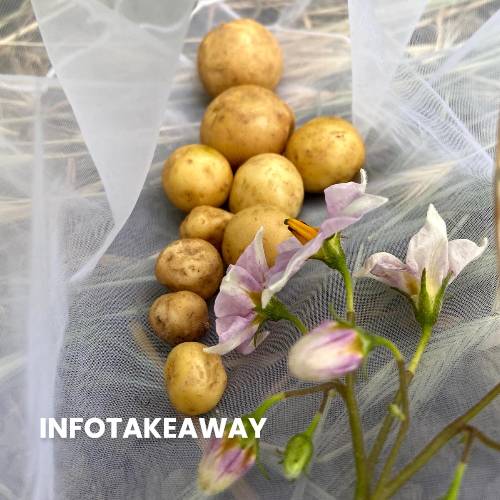Is potato a fruit or vegetable? If you are like most people, the answer to this question may seem obvious. After all, everyone knows that the potato is a vegetable, not a fruit, right? However, the correct answer depends on who you ask instead of an obvious yes or no. Although there are clear definitions of what makes something a fruit versus a vegetable, it turns out that these classifications can be confusing and unclear in some cases. Keep reading to learn more about whether potatoes are fruits or vegetables.

Is Potato A Fruit Or A Vegetable
It’s long been known that humans aren’t alone in classifying food as fruit, vegetable, grain, etc.
The U.S. Library of Congress suggests that vegetables be defined by their intended use—and if that’s your benchmark, then potatoes are indeed considered vegetables (just as tomatoes and eggplants).
However, some still believe the distinction depends on whether an item is sweet enough to be eaten on its own; potatoes fall short in that regard (or so say critics), which leads them to classify it as more of a tuber than anything else.
An even deeper investigation into how others worldwide categorize foods may lead you to consider placing potatoes in yet another category: starch.
While many would have you believe that potato belongs in any of these categories, botanists and nutritionists agree on one thing: Potatoes are packed with nutrients and can play an important role in a healthy diet.
Thanks to their history as part of our staple crops, they contain elements found in whole grains while being free from those extra ingredients we consider harmful today.
And though they’re naturally starchy, research shows there’s not much separating a baked potato from something like roasted Brussels sprouts when it comes to blood sugar levels.
The bottom line? A study published in 2013 concluded that there is no consensus among Americans about what constitutes a vegetable versus a fruit. Still, it noted how other countries’ cultures often influenced early attitudes toward food.
Could all of those questions about what makes something fit into each category be making us all veggie-schizophrenic?
There may be value in considering fruit and vegetable labels for what matters: flavor. Perhaps calling potatoes fruits means we’re finally ready to appreciate them for their true taste!
Is Potato A Fruit
Many people wonder if a potato is a fruit or vegetable, and it’s true that most people don’t know what it is. Moreover, even if we say that potato is a fruit, it certainly isn’t an edible fruit since it can’t be eaten raw like tomatoes and apples. This can only mean that a potato is a vegetable.
Potato is a great food staple used in many countries throughout the world.
While potatoes are members of both the nightshade family (along with tomatoes) and plants like beans, peas, squashes, and cucumbers, botanically speaking, they are tubers—starchy underground stems.
They are technically fruits because they come from plants in which flowers have already been pollinated. But potatoes aren’t sweet, so you may also consider them a root vegetable.
Potatoes can be eaten raw but taste better when cooked, so we consider them more on par with other veggies than fruits.
Is Potato A Vegetable
Fruits and vegetables are very healthy. Therefore, eat as much of them as you can on a daily basis. Potato falls under the list of starchy foods. Though different types of potatoes don’t have that much starch.
However, there’s some confusion over whether potatoes should be classified as fruit or vegetables.
In reality, they’re neither one, but they are edible plants with many vitamins and minerals that our bodies need to stay healthy and strong.
Potato is also something we can cook up to enjoy its taste for dinner.
Are Potatoes Healthy?
Potatoes may be high in carbs, but that doesn’t mean they don’t have their health benefits.
Low-carb diets are all over the media right now, as experts praise them for their weight loss benefits. This doesn’t mean that carbohydrates are bad, it just means that there are different situations where you should consider eating carbohydrates or not.
When you consider fiber and vitamins, potatoes pack in quite a few nutrients, other low-carb foods (like legumes) also contain plenty of valuable vitamins and minerals.
Limiting your carb intake is good if you struggle with blood sugar issues or need to lose some weight; make sure not to completely cut out certain food groups (that is never a good idea).
If there’s one thing we can learn from people following these restrictive diets, it’s that they should pay attention to portion sizes!
Different Kinds Of Potatoes
What kinds of potatoes are there, and how are they different from one another?
Let’s start by distinguishing between tuber and non-tuber varieties. In short, tubers have been part of our diets for 10,000 years because they grow in underground storage organs.
Common tuber vegetables include carrots, turnips, parsnips, sweet potatoes, and celeriac.
Non-tubers, also called non-bulbing root crops, are subcategorized into bulb veggies like onions, shallots, and garlic; stems like asparagus and rhubarb; corms like taro; and succulents such as yucca. There are many different varieties of potatoes that we’ll discuss now.
What Are White Potatoes?
White potato is any of the various starchy tubers of plants in the Solanaceae family. The term white potato applies to several different varieties, but it most often refers to baking potatoes, also known as russet potatoes. A russet potato has white skin and light yellow flesh; they are often sold as baking potatoes in North America and Great Britain. These are mostly found in fresh, frozen, or canned supermarkets.
What Are Red Skinned Potatoes?
Red-skinned potatoes are several types of potatoes commonly eaten in North America. They have red skin and flesh, which means they belong to the Solanaceae family, like tomatoes, eggplants, chilis, bell peppers, and even tobacco.
These tubers are known for their sweet flavor and starchy texture. They’re also good sources of Vitamin C, potassium, manganese, and copper.
Potatoes are versatile too; they can be made into chips/fries (what Americans call French fries), mashed potato balls/cakes called croquettes in Europe and Asia; it’s also used to make potato bread/buns that you can use as sandwich bread at home.
What Are Yellow Potatoes?
The most common type of potato is called a russet. It’s long, brown, and waxy, with thick skin ranging from white to yellow to red. They are a staple food in many countries in the world.
This variety accounts for approximately 70 percent of all potatoes grown each year, mostly in North America. Russets have low moisture and high starch content.
They’re best for baking, frying, or boiling—and are essential for mashed potatoes and French fries. Because they contain less water than other types of potato, they also make excellent chippers when cut into thin slices for home fryers.
What Are Sweet Potatoes?

A sweet potato is a type of yam, but yams aren’t sweet. They’re not even potatoes, they belong to a completely different species called Dioscoreaceae.
Sweet potatoes (or yams) were originally cultivated in Asia, Africa, and South America and have spread throughout other parts of the world.
Do Potatoes Have Protein?
A potato is classified as a vegetable, although some people disagree. However, it does contain protein. A large potato will have about five grams of protein. Some other vegetables and fruits that contain significant amounts of protein include spinach (one cup), raspberries (one cup), watermelon (one wedge), and peas (half cup). All vegetables and fruits are low in calories, high in fiber, and have little to no fat.
Do Potatoes Have Carbohydrates?

Potatoes have many beneficial carbohydrates as well as complex carbohydrate that help strengthen and keep the functioning of our body optimized.
The carb count in potatoes varies depending on their preparation.
For example, 1 cup of baked potato has 36 grams of carbs; and boiled potatoes have 17 grams.
The carbs in potatoes are mostly glucose and various other sugars, including fructose, sucrose, maltose, and lactose.
Therefore, you should consider them both fruits as well as vegetables. Potatoes also contain about 4 percent protein.
Interesting Facts About Potatoes

Potatoes are members of a family of plants called Nightshades, including tomatoes, eggplants, and peppers.
Nowadays, potatoes are mainly made from seeds called botanical seeds. These new potatoes are than altered to produce healthy seed tubers.
There are no grocery stores that don’t contain potatoes. Potatoes play an important role in keeping bodily functions optimized.
In reailty, potato is just a root and basically, it is an edible root. Potatoes contain iron, that are necessary to keep our blood cells healthy.
They belong to the Solanaceae family of plants. Potatoes were originally native to Peru and quickly spread through South America after being brought there by Spanish explorers in 1536.
In Ireland and Great Britain (18th century), people were so poor that they couldn’t afford to eat anything but potatoes!
There are 615 possible ways to make French fries using 7 different cuts of potatoes. Potatoes originated on a mountain range in Bolivia called The Roof of The World.
Switzerland once made a law that said if you grew too many potato plants, you had to pay taxes on them! Potatoes provide 32% of their calories from protein when eaten with their skins.
Please think twice before throwing out your potato peels; they’re full of nutrients, such as calcium and iron.
Conclusion – Is Potato A Fruit Or Vegetable
Is potato a fruit or vegetable? Potato isn’t a fruit or vegetable, and it’s considered a tuber.
The U.S. government decides what fruits, vegetables, and other plant foods are based on their botanical family.
Potatoes are part of Solanaceae, including things like tomatoes and eggplants (vegetables), but not avocados (fruit).
Other tubers that are often confused with fruits include cassava and sweet potatoes.
It’s been a matter of some debate whether or not potatoes should be included in healthy diets; while they don’t have many vitamins, they do have lots of antioxidants, which can help prevent disease.
Plus, potatoes are packed with potassium, iron, and magnesium—and when paired with healthy fats (like avocado), make for an excellent keto snack.
You could also try roasting them in olive oil instead of butter to boost your intake of heart-healthy fats.
We hope you enjoyed this article, also check out our other articles such as “does walmart cash personal checks“, “how many players on a baseball team“, and “are pandas dangerous?”